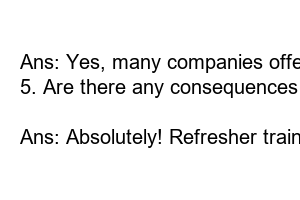안전관리자 보수교육
Title: Why Safety Manager Refresher Training is Essential for an Incident-Free Workplace
Introduction:
Maintaining a safe working environment is crucial for the overall success and well-being of both employees and businesses. One way to ensure safety standards are upheld is by providing regular refresher training to safety managers. In this blog post, we will delve into the importance of safety manager refresher training and how it plays a vital role in preventing workplace incidents.
Subheading 1: The Value of Regular Training
Refreshing and updating safety managers’ knowledge and skills is essential to adapt to evolving workplace risks and regulations. Effective safety management requires staying ahead of changing trends, technologies, and best practices.
Subheading 2: Retaining Knowledge and Improving Confidence
Through refresher training, safety managers can reinforce the fundamental principles of safety management. Continuing education equips them with the latest knowledge, enhances their decision-making abilities, and empowers them to confidently address potential hazards.
Subheading 3: Staying Up-to-Date with Changing Regulations
Safety regulations are frequently revised and updated, making it imperative for safety managers to stay informed and comply with current requirements. Refresher training enables them to stay abreast of these changes, ensuring the workplace is aligned with legal obligations.
Subheading 4: Identification and Mitigation of New Risks
With advances in technology, workplace risks are constantly evolving. Refresher training empowers safety managers to identify and analyze new hazards, develop proactive measures, and implement strategies to mitigate potential risks before accidents occur.
Subheading 5: Enhancing Communication and Collaboration
Effective communication and collaboration amongst safety managers, employees, and stakeholders are vital for maintaining a safe workplace. Refresher training offers an opportunity for safety managers to improve their communication skills, enabling them to better engage and educate employees about safety protocols.
Subheading 6: Evaluating Incident Response and Investigation Techniques
Refresher training provides an opportunity to assess the effectiveness of incident response and investigation techniques. By identifying any shortcomings and implementing improvements, safety managers can more effectively handle accidents, minimize their impact, and prevent future occurrences.
Subheading 7: Promoting a Safety Culture
Safety manager refresher training not only benefits individual managers but also cultivates a culture of safety within an organization. When safety is prioritized and consistently reinforced, employees are more likely to follow protocols and take personal responsibility for their own well-being and that of their colleagues.
Summary:
Safety manager refresher training is an indispensable investment for businesses aiming to prevent workplace accidents. By providing continuous education, safety managers can stay informed about changing regulations, identify and mitigate new risks, improve communication skills, and create a safety-oriented culture. Regular training empowers safety managers to lead by example and protect the well-being of employees, further contributing to the success of the organization.
FAQs:
1. How often should safety managers undergo refresher training?
Ans: Refresher training should ideally be conducted annually or whenever significant changes in regulations or workplace risks occur.
2. Is safety manager refresher training mandatory?
Ans: While regulations vary by jurisdiction, many industries and governmental bodies require safety managers to undergo regular refresher training.
3. How long does refresher training typically last?
Ans: The duration of refresher training programs varies depending on the content and requirements, but they typically range from a few hours to a few days.
4. Can refresher training be conducted online?
Ans: Yes, many companies offer online refresher training courses, providing flexibility and convenience for safety managers.
5. Are there any consequences for not providing refresher training to safety managers?
Ans: Failing to provide refresher training may result in increased liability for an organization in the event of workplace accidents or non-compliance with safety regulations.
6. Can safety managers benefit from networking during refresher training sessions?
Ans: Absolutely! Refresher training sessions often facilitate networking opportunities, allowing safety managers to learn from their peers and gain valuable insights from different perspectives.

